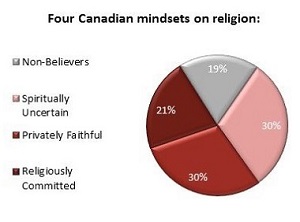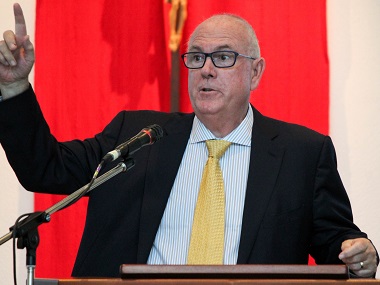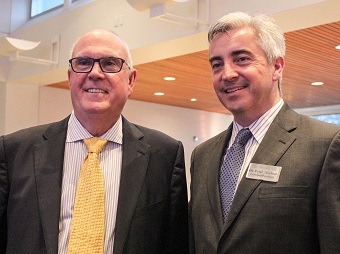Veteran pollster Angus Reid used results of recent research to encourage people of faith to exercise good communication skills, link together across the faith spectrum and exercise leadership rooted in hope, when he delivered the annual Carr Lecture in the chapel of St. Mark’s College at UBC May 1.
He told close to 200 lecture attenders at the Catholic college that among the many words used by both believers and non-believers to delineate religious ideas, the terms “forgiveness” and “mercy” found much warm resonance among people drawn to faith. (And Pope Francis understands that, he opined.)
Words like “religion,” “evangelism” and “original sin” tended to be less understood or even misunderstood, Reid added.
The basis for the pollster’s lecture was recent research that the non-profit Angus Reid Institute has done in cooperation with Cardus, as part of the faith-based think tank’s Faith in Canada 150 project. Details on the results of that research are accessible under this heading: A spectrum of spirituality: Canadians keep the faith to varying degrees, but few reject it entirely.
Reid said the research reflects a broadening of earlier Angus Reid faith-based projects, which had concentrated mainly on the Canadian Christian spectrum. Three objectives helped shape the project:
-
Exploring religiosity and faith in Canada
-
Testing the implications of having a faith – not in the next life but in this life – touching on such matters as the influence of faith on family life, a sense of morality and the nation’s social and political fabric.
-
Attempting to determine possible transformative patterns of belief and faith in Canada in decades to come.
He explained that the research commissioned by Cardus was based on surveys of 2,000 Canadians, led by institute executive director Shachi Kurl. Over 80 percent of those surveyed had some relationship to Christian roots. The remainder’s connections were with other world religions. The ratio approximates reported Canadian breakdowns.
Many questions were posed in the survey, and seven were chosen to help identify four groupings into which Canadians fit on the faith spectrum. Those seven questions, slightly edited, are:
-
Do you believe in God or a higher power?
-
Do you think there is life after death?
-
Do you think there is an active God prepared to listen to you so the act of prayer has some meaning?
-
Do you spend any time reading the Bible or another sacred text?
-
Do you have an experience of God’s presence?
-
What is the likelihood that you would desire your children to have an education in your faith?
-
Do you yourself attend religious services?
 Simply put, the four categories which could be used to define Canadian society from a faith perspective – and some of the related findings – were as follows:
Simply put, the four categories which could be used to define Canadian society from a faith perspective – and some of the related findings – were as follows:
-
The religiously committed. This group represents 21 percent of the population – one person in five. On the Prairies and in the Atlantic provinces they represent a higher percentage. About 10 percent more women than men fall into this category. Religiously committed people answer all seven of the questions in the positive. And committed people are usually not uncomfortable around other faith groups, but find their least comfort level with atheists. Twice as many committed people are to be found among first generation immigrants or members of visible minorities.
“[The religiously committed] tend to be socially conservative on many moral issues but tend to swing left on many economic issues,” Reid said.
-
The privately faithful represent 30 percent of Canadian society. They tend to be “big on God. They pray and believe in an active God. But they have negative views on organized religion. They were raised religiously but “slipped out the side door,” the pollster said, adding that with 55 percent of the privately faithful, “there is a yearning, but they can’t find way back in.” Two-thirds of them “want to pass on their faith to their kids. And, by the way, many are lapsed Catholics,” he said
-
The spiritually uncertain also represent 30 percent of the population. “They only answer to belief in God,” and they are “the most curious about death and the meaning in life. Their biggest concern: Is this all there is?” The highest percentage of the spiritually uncertain are in Quebec.
-
The non-believers represent 19 percent of Canadians on average but much more heavily populate British Columbia – close to 50 percent. Noted Reid: “They say ‘no’ to all seven questions, are uncomfortable with people of faith and are liberal on matters of sexuality, transgender etc.” He noted, in an aside, that non-believers tend to oppose genetically modified foods but are all right with genetically-modified babies.
On a personal level, Reid paid tribute to Father Henry Carr (after whom the Carr Lecture is named), a Basilian who played major roles in Catholic higher education in Ontario, the Prairies and British Columbia during a large part of the 20th century. He told how a 19 year old woman studied ethics and philosophy under Carr and went on to be a devout Catholic, a mother of seven and a very smart person.
“And that woman was my mother,” Reid noted.
Lloyd Mackey is a leading writer on religious faith in Canada, and senior editorial advisor to Faith in Canada 150′s Thread of 1000 Stories. This article was originally posted on Convivium and is re-posted by permission.
For another take on Angus Reid’s talk, by Damon Mak, go here.



Good article, Lloyd. Appreciated getting to know more about Angus Reid and the current research. I had read the poll results earlier on. This helps put more context to it.